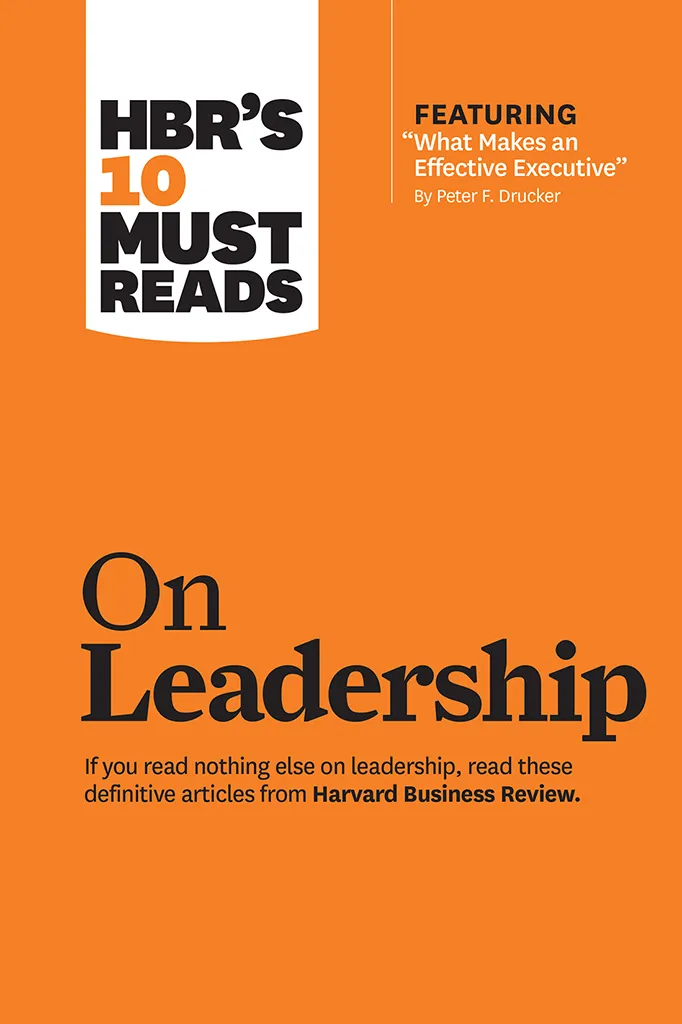![]()
![]()
On
Leadership
HARVARD BUSINESS REVIEW PRESS
Boston, Massachusetts
![]()
Find more digital content or join the discussion on www.hbr.org.
The web addresses referenced and linked in this book were live and correct at the time of the book’s publication but may be subject to change.
Copyright 2011 Harvard Business School Publishing Corporation
All rights reserved
No part of this publication may be reproduced, stored in or introduced into a retrieval system, or transmitted, in any form, or by any means (electronic, mechanical, photocopying, recording, or otherwise), without the prior permission of the publisher. Requests for permission should be directed to
[email protected], or mailed to Permissions, Harvard Business School Publishing, 60 Harvard Way, Boston, Massachusetts 02163.
Library of Congress Cataloging-in-Publication Data
HBR’s 10 must reads on leadership
p. cm.
Includes index.
ISBN 978-1-4221-5797-8 (pbk. : alk. paper) 1. Leadership. I. Harvard business review. II. Title: HBR’s ten must reads on leadership. III. Title: Harvard business review’s 10 must reads on leadership.
HD57.7.H3914 2010
658.4'092—dc22
2010031617
eISBN: 9781422172025
![]()
Contents
What Makes a Leader?
Daniel Goleman
What Makes an Effective Executive
Peter F. Drucker
What Leaders Really Do
John P. Kotter
The Work of Leadership
Ronald A. Heifetz and Donald L. Laurie
Why Should Anyone Be Led by You?
Robert Goffee and Gareth Jones
Crucibles of Leadership
Warren G. Bennis and Robert J. Thomas
Level 5 Leadership: The Triumph of Humility and Fierce Resolve
Jim Collins
Seven Transformations of Leadership
David Rooke and William R. Torbert
Discovering Your Authentic Leadership
Bill George, Peter Sims, Andrew N. McLean, and Diana Mayer
In Praise of the Incomplete Leader
Deborah Ancona, Thomas W. Malone, Wanda J. Orlikowski, and Peter M. Senge
About the Contributors
Index
![]()
What Makes a Leader?
by Daniel Goleman
EVERY BUSINESSPERSON KNOWS a story about a highly intelligent, highly skilled executive who was promoted into a leadership position only to fail at the job. And they also know a story about someone with solid—but not extraordinary—intellectual abilities and technical skills who was promoted into a similar position and then soared.
Such anecdotes support the widespread belief that identifying individuals with the “right stuff” to be leaders is more art than science. After all, the personal styles of superb leaders vary: Some leaders are subdued and analytical; others shout their manifestos from the mountaintops. And just as important, different situations call for different types of leadership. Most mergers need a sensitive negotiator at the helm, whereas many turnarounds require a more forceful authority.
I have found, however, that the most effective leaders are alike in one crucial way: They all have a high degree of what has come to be known as emotional intelligence. It’s not that IQ and technical skills are irrelevant. They do matter, but mainly as “threshold capabilities”; that is, they are the entry-level requirements for executive positions. But my research, along with other recent studies, clearly shows that emotional intelligence is the sine qua non of leadership. Without it, a person can have the best training in the world, an incisive, analytical mind, and an endless supply of smart ideas, but he still won’t make a great leader.
In the course of the past year, my colleagues and I have focused on how emotional intelligence operates at work. We have examined the relationship between emotional intelligence and effective performance, especially in leaders. And we have observed how emotional intelligence shows itself on the job. How can you tell if someone has high emotional intelligence, for example, and how can you recognize it in yourself? In the following pages, we’ll explore these questions, taking each of the components of emotional intelligence—self-awareness, self-regulation, motivation, empathy, and social skill—in turn.
Evaluating Emotional Intelligence
Most large companies today have employed trained psychologists to develop what are known as “competency models” to aid them in identifying, training, and promoting likely stars in the leadership firmament. The psychologists have also developed such models for lower-level positions. And in recent years, I have analyzed competency models from 188 companies, most of which were large and global and included the likes of Lucent Technologies, British Airways, and Credit Suisse.
In carrying out this work, my objective was to determine which personal capabilities drove outstanding performance within these organizations, and to what degree they did so. I grouped capabilities into three categories: purely technical skills like accounting and business planning; cognitive abilities like analytical reasoning; and competencies demonstrating emotional intelligence, such as the ability to work with others and effectiveness in leading change.
To create some of the competency models, psychologists asked senior managers at the companies to identify the capabilities that typified the organization’s most outstanding leaders. To create other models, the psychologists used objective criteria, such as a division’s profitability, to differentiate the star performers at senior levels within their organizations from the average ones. Those individuals were then extensively interviewed and tested, and their capabilities were compared. This process resulted in the creation of lists of ingredients for highly effective leaders. The lists ranged in length from seven to 15 items and included such ingredients as initiative and strategic vision.
When I analyzed all this data, I found dramatic results. To be sure, intellect was a driver of outstanding performance. Cognitive skills such as big-picture thinking and long-term vision were particularly important. But when I calculated the ratio of technical skills, IQ, and emotional intelligence as ingredients of excellent performance, emotional intelligence proved to be twice as important...


